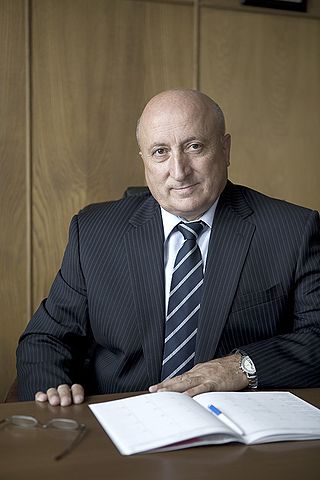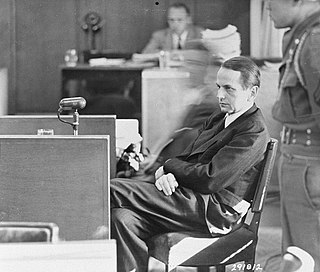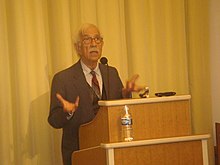
The American Psychological Association (APA) is the largest scientific and professional organization of psychologists in the United States, with over 146,000 members, including scientists, educators, clinicians, consultants, and students. It has 54 divisions—interest groups for different subspecialties of psychology or topical areas. The APA has an annual budget of around $125 million.
Holocaust denial is an antisemitic conspiracy theory that asserts that the Nazi genocide of Jews, known as the Holocaust, is a myth, fabrication, or exaggeration. Holocaust denial involves making one or more of the following false claims:

Bernard Lewis, was a British American historian specialized in Oriental studies. He was also known as a public intellectual and political commentator. Lewis was the Cleveland E. Dodge Professor Emeritus of Near Eastern Studies at Princeton University. Lewis's expertise was in the history of Islam and the interaction between Islam and the West.
Clinical psychology is an integration of human science, behavioral science, theory, and clinical knowledge for the purpose of understanding, preventing, and relieving psychologically-based distress or dysfunction and to promote subjective well-being and personal development. Central to its practice are psychological assessment, clinical formulation, and psychotherapy, although clinical psychologists also engage in research, teaching, consultation, forensic testimony, and program development and administration. In many countries, clinical psychology is a regulated mental health profession.

The International Association of Genocide Scholars (IAGS) is an international non-partisan organization that seeks to further research and teaching about the nature, causes, and consequences of genocide, including the Armenian genocide, the Holocaust, the genocides in Cambodia, Rwanda, Burundi, Bosnia-Herzogovina, Bangladesh, Sudan, and other nations. The IAGS also advances policy studies on the prevention of genocide. The association's members consider comparative research, case studies, links between genocide and other human rights violations, predictive models for prevention of genocide, and tribunals and courts for the punishment of genocide. The organization's membership includes academics, anti-genocide activists, artists, genocide survivors, journalists, jurists, and public policy makers. Membership is open to interested persons worldwide.
Reuven Pinchas Bulka was a Canadian rabbi, writer, broadcaster, and activist. He was the spiritual leader of Congregation Machzikei Hadas in Ottawa from 1967, first as Rabbi and then as Rabbi Emeritus, and served as co-president of the Canadian Jewish Congress from 2007 to 2009. Bulka's work with Kind Canada led to recognition the third week of February in each and every year as "Kindness Week" in Canada.

Armenian genocide denial is the claim that the Ottoman Empire and its ruling party, the Committee of Union and Progress (CUP), did not commit genocide against its Armenian citizens during World War I—a crime documented in a large body of evidence and affirmed by the vast majority of scholars. The perpetrators denied the genocide as they carried it out, claiming that Armenians in the Ottoman Empire were resettled for military reasons, not exterminated. In the genocide's aftermath, incriminating documents were systematically destroyed, and denial has been the policy of every government of the Republic of Turkey, as of 2023, and later adopted by the Republic of Azerbaijan, as of 1991.
Robert-Jay Green is founder and senior research fellow of the Rockway Institute, and distinguished professor (emeritus) in the Clinical Psychology PhD Program of the California School of Professional Psychology, a division of Alliant International University.

Stanford Jay Shaw was an American historian, best known for his works on the late Ottoman Empire, Turkish Jews, and the early Turkish Republic. Shaw's works have been criticized for their lack of factual accuracy as well as denial of the Armenian genocide, and other pro-Turkish bias.

A bilateral relationship exists between Armenia and Israel. From 1993 to 2007, Armenia was served by the Embassy of Israel in Georgia. In 1996, Tsolak Momjian was appointed the honorary consul of Armenia in Jerusalem. Eleven years later, the residence of the Embassy of Israel in Armenia was moved to Jerusalem. In October 2010, Shmuel Meirom was appointed the Israeli ambassador to Armenia. Armen Melkonian was appointed the Armenian ambassador to Israel in 2012, with a residence in Cairo. In October of that year, Melkonian presented his credentials to Israeli President Shimon Peres. On 21 September 2019 Armenia announced that it would be opening an embassy in Israel. Despite generally cordial ties between the two, relations soured after Armenia withdrew its ambassador to Israel due to Israeli arms supply to Armenia's enemy, Azerbaijan, in the 2020 Nagorno-Karabakh War.
The institute on the Holocaust and Genocide was founded in Jerusalem, in 1979, by Israeli scholars Israel W. Charny, Shamai Davidson and Nobel Laureate Elie Wiesel.

Eva Fogelman is an American psychologist, writer, filmmaker and a pioneer in the treatment of psychological effects of the Holocaust on survivors and their descendants. She is the author of the Pulitzer Prize nominated book Conscience and Courage: Rescuers of Jews During the Holocaust and co-editor of Children During the Nazi Reign: Psychological Perspectives on the Interview Process. She is the writer and co-producer of the award-winning documentary Breaking the Silence: the Generation After the Holocaust and co-author of Children in the Holocaust and Its Aftermath: Historical and Psychological Studies of the Kestenberg Archive (2019).
Armenian–Jewish relations are complex, often due to political and historical reasons.
Jay Lebow is an American family psychologist who is senior scholar at the Family Institute at Northwestern University, clinical professor at Northwestern University and is editor-in-chief of the journal Family Process. He is board certified by the American Board of Professional Psychology. Lebow is known for his publications and presentations about the practice of couple and family therapy, integrative psychotherapy, the relationship of research and psychotherapy practice, and psychotherapy in difficult divorce, as well as for his role as an editor in the fields of couple and family therapy and family science. He is the author or editor of 13 books and has written 200 journal articles and book chapters.

Sedrak A. Sedrakyan is an Armenian psychologist, doctor of Psychological Sciences, and professor.

Genocide justification is the claim that a genocide is morally excusable/defensible, necessary, and/or sanctioned by law. Genocide justification differs from genocide denial, which is the attempt to reject the occurrence of genocide. Perpetrators often claim that genocide victims presented a serious threat, justifying their actions by stating it was legitimate self-defense of a nation or state. According to modern international criminal law, there can be no excuse for genocide. Genocide is often camouflaged as military activity against combatants, and the distinction between denial and justification is often blurred.
Bibliography of the Armenian genocide is a list of books about the Armenian genocide:

The relationship between the Armenian genocide and the Holocaust has been discussed by scholars. The majority of scholars believe that there is a direct causal relationship between the Armenian genocide and the Holocaust, however, some of them do not believe that there is a direct causal relationship between the two genocides.
The International Conference on the Holocaust and Genocide was the first major conference in the field of genocide studies, held in Tel Aviv on 20–24 June 1982. It was organized by Israel Charny, Elie Wiesel, Shamai Davidson, and their Institute on the Holocaust and Genocide, founded in 1979. The conference's objective was to further the understanding and prevention of all genocides; it marked the shift from viewing genocide as an irrational phenomenon to one that could be studied and understood.
Below is an outline of articles on the academic field of genocide studies and subjects closely and directly related to the field of genocide studies; this is not an outline of acts or events related to genocide or topics loosely or sometimes related to the field of genocide studies. The Event outlines section contains links to outlines of acts of genocide.









